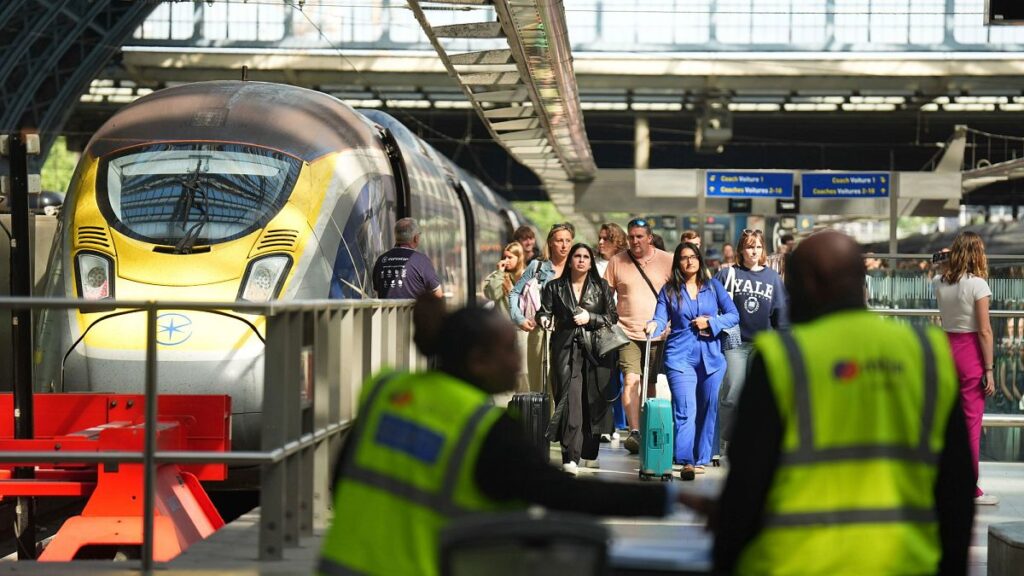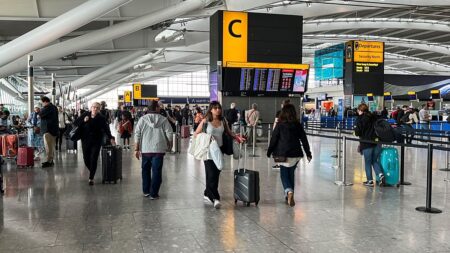The EU’s new entry/exit system (EES) will be rolled out beginning on 12 October.
Once in place, non-EU travellers taking the Eurostar from the UK into the Schengen area will need to scan their passports or other travel documents at dedicated kiosks at London St Pancras International station.
During the process, they will also be asked some questions related to their travel plans.
Some confusion has arisen around these questions, particularly the reported requirement for travellers to have proof of medical insurance.
Here is clarification from Eurostar and the UK government.
New EES border checks for Eurostar passengers
With the EES in place, Eurostar passengers heading to Paris, Brussels and Amsterdam will undergo border checks at St Pancras station.
At kiosks, the system will register the traveller’s name, biometric data, and the date and place of entry and exit.
Passengers will also be asked four questions about pre-booked accommodation, a return ticket, and funds sufficient to cover their stay in the EU, and insurance.
If you answer “no” to any of these questions, a French border police agent will be alerted, and you may be refused entry into the EU.
Passengers are also warned against answering “yes” untruthfully, as “Your answers are binding, you may be asked to provide proof.”
From 12 October, only business and premium class passengers will be subject to these checks. For other passengers, they will begin in January 2026.
Do Eurostar passengers need proof of medical insurance?
The specific questions Eurostar passengers will be asked at kiosks were initially reported in UK media to be:
- Do you have somewhere to stay?
- Do you have a return ticket?
- Do you have sufficient funds to support yourself during your stay (credit card, cash)?
- Do you have medical insurance?
Eurostar has since confirmed to Euronews Travel that the last question regarding medical insurance is a translation error and should read ‘travel insurance‘.
“At present, the English translations are provisional and, as we understand it, will be reviewed and updated by the French Ministry of the Interior,” a spokesperson for the company said.
However, the information is still not fully clear, even from official sources.
A spokesperson for the UK government confirmed to Euronews Travel: “From 12th October, passengers who register for EES at a kiosk may need to answer a series of questions, including whether they have medical insurance.”
But they reiterate that medical insurance will not be required after the launch of the EES.
“Medical insurance will not be a mandatory requirement for UK citizens travelling to the EU under EES. However, we strongly recommend that all passengers purchase comprehensive travel insurance, including medical cover, before travelling abroad.”
Non-EU travellers to France need proof of medical insurance
While medical insurance is not a requirement of the European Commission for travellers (from the UK or other nations) entering the Schengen area, it is part of national controls by the French authorities for third-country nationals.
“You must have an insurance certificate covering all medical and hospital expenses for which you may be liable for the duration of your stay in France, as well as medical repatriation costs and expenses in the event of death,” the official guidance reads.
In practice, travellers arriving at French borders have rarely been asked to provide proof of medical insurance.
It is not yet clear whether the requirement will be enforced more routinely following the launch of the EES.
The stipulation that Eurostar passengers must have a return ticket is also part of France’s national checks. The Schengen rule permits any proof of transport booked to leave the zone, including onward journeys to other non-EU countries.
Euronews Travel has reached out to the European Commission for further clarification.
Read the full article here














